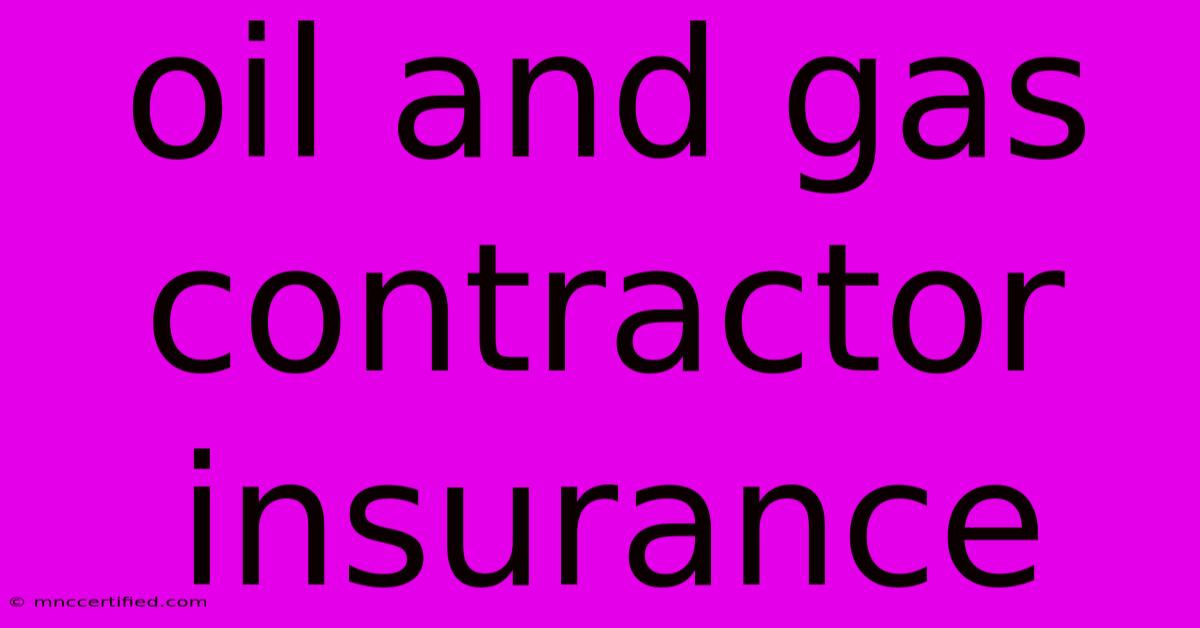Oil And Gas Contractor Insurance

Table of Contents
Oil and Gas Contractor Insurance: A Comprehensive Guide
The oil and gas industry is inherently risky. From volatile chemicals and heavy machinery to remote locations and challenging weather conditions, contractors face a unique set of potential liabilities. This is why securing the right oil and gas contractor insurance is not just advisable—it's absolutely crucial for protecting your business and your financial future. This comprehensive guide explores the essential types of insurance coverage every oil and gas contractor should consider.
Understanding the Risks
Before diving into specific policies, it's vital to understand the specific risks oil and gas contractors face. These include:
- Workplace Accidents: Injuries to employees, subcontractors, or even third parties are a significant concern. The costs associated with medical bills, lost wages, and potential lawsuits can be devastating.
- Property Damage: Damage to equipment, facilities, or even the environment can result in hefty repair costs and environmental remediation expenses.
- Pollution: Oil spills and other environmental incidents can have catastrophic consequences, leading to massive fines, cleanup costs, and reputational damage.
- Liability to Third Parties: Claims arising from bodily injury, property damage, or advertising injury caused by your operations need to be covered.
- Vehicle Accidents: Many oil and gas operations involve the use of vehicles, increasing the risk of accidents and related liability.
Essential Insurance Policies for Oil and Gas Contractors
Knowing the risks, let's explore the key insurance policies that can mitigate them:
1. Commercial General Liability (CGL) Insurance
This is the cornerstone of any contractor's insurance program. CGL insurance protects your business from claims of bodily injury or property damage caused by your operations, as well as advertising injury. It's crucial for covering third-party claims. Ensure your policy has sufficient coverage limits to address potential large-scale incidents.
2. Workers' Compensation Insurance
This is legally mandated in most jurisdictions and covers medical expenses and lost wages for employees injured on the job. Failure to carry workers' compensation insurance can result in significant penalties. Ensure your policy adequately covers your employees and the specific hazards of the oil and gas industry.
3. Pollution Liability Insurance
Given the inherent environmental risks, pollution liability insurance is paramount. This policy covers the costs of cleaning up pollution caused by your operations, as well as liability claims arising from such pollution. This is a non-negotiable for oil and gas contractors. Consider coverage for both sudden and gradual pollution.
4. Umbrella Liability Insurance
This provides extra liability coverage on top of your CGL and other liability policies. It acts as a safety net for claims exceeding the limits of your underlying policies. It's a crucial layer of protection against catastrophic events.
5. Commercial Auto Insurance
If your operations involve vehicles, comprehensive commercial auto insurance is essential. This covers liability for accidents involving your company vehicles, as well as physical damage to those vehicles. Ensure you have appropriate coverage for the types of vehicles used in your operations.
6. Equipment Breakdown Insurance
This covers the cost of repairing or replacing equipment that breaks down due to mechanical failure. Downtime in the oil and gas industry can be incredibly costly, so this insurance can help mitigate those financial losses.
7. Professional Liability Insurance (Errors and Omissions)
This protects against claims of negligence or mistakes in your professional services. For contractors providing specialized services, this is a key element of risk mitigation.
Choosing the Right Oil and Gas Contractor Insurance Provider
Selecting the right insurance provider is as important as selecting the right policies. Consider these factors:
- Experience in the Oil and Gas Industry: Look for insurers with a proven track record of working with companies in your specific niche.
- Financial Stability: Choose a financially sound insurer capable of meeting its obligations in the event of a claim.
- Customer Service: Good customer service is crucial when dealing with complex insurance issues.
- Policy Coverage and Limits: Carefully review the policy wording to ensure it adequately covers your specific needs and risks.
Conclusion
Securing adequate oil and gas contractor insurance is not an expense; it's an investment in the long-term viability of your business. By understanding the risks and selecting the appropriate policies, you can protect your assets, your employees, and your reputation. Don't hesitate to consult with an experienced insurance broker specializing in the oil and gas industry to ensure you have the right coverage for your unique needs. Remember, proper insurance is a critical component of successful and sustainable operations in this demanding sector.

Thank you for visiting our website wich cover about Oil And Gas Contractor Insurance. We hope the information provided has been useful to you. Feel free to contact us if you have any questions or need further assistance. See you next time and dont miss to bookmark.
Featured Posts
-
Non Owner Car Insurance Oklahoma
Nov 22, 2024
-
Browns Vs Tonight Mnf Channel
Nov 22, 2024
-
Miller Insurance Middletown Ohio
Nov 22, 2024
-
Do Expired Tags Affect Insurance
Nov 22, 2024
-
Richard Coles Joins I M A Celeb
Nov 22, 2024